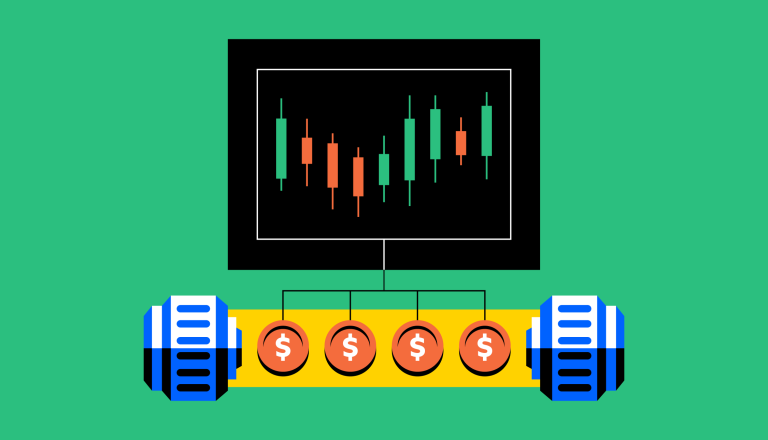Everything you need to know about the first-ever U.S. spot Bitcoin ETFs
Why an ETF matters: the transformative opportunity of spot bitcoin ETFs

Updated on January 24, 2024
Originally published on October 19, 2021
Ever since the Winklevoss twins attempted to introduce the first Bitcoin ETF in 2013, the concept of Bitcoin ETFs has been a hotly debated point in cryptocurrency market conversations. Since 2021, Bitcoin futures ETFs have been traded on U.S. exchanges, but the milestone approval of spot Bitcoin ETFs on January 10, 2024 marked a significant moment in the cryptocurrency world, with $4.6 billion in volume traded on the first day.
To understand why this news was met with such interest, we need to zoom out a little — and take a look at what ETFs are, what Bitcoin futures are, and why it all matters.
What is an ETF?
An exchange-traded fund (ETF) is akin to a mutual fund but tracks the performance of an underlying asset or index rather than one company. It is a publicly traded investment vehicle that reflects the performance of an asset (or a group of assets), offering investors a slice of its market value.
In the context of a spot Bitcoin ETF, the ETF essentially allows one to buy into a fund that owns bitcoin and not the cryptocurrency itself. This approach simplifies the process for those already accustomed to conventional investing without necessitating the adoption of new tools or platforms typically associated with direct cryptocurrency transactions.
In contrast to Bitcoin futures ETFs that existed well before January 2024, a spot Bitcoin ETF holds actual bitcoin, offering direct exposure to its real-time market value, and doesn't simply deal with future price contracts.
What's so exciting about the arrival of spot bitcoin ETFs?
The introduction of spot Bitcoin ETFs is considered a pivotal moment for many in the financial realm for a few notable reasons:
Firstly, spot Bitcoin ETFs address a clear demand from both individual investors and larger institutions who are eager to engage with the crypto market, yet prefer not to manage the assets directly.
Secondly, the rollout of spot Bitcoin ETFs reflects a maturing crypto market, now ready to embrace regulated, standardized financial instruments, potentially attracting further institutional investments. This step forward can be seen as a significant move towards a more inclusive regulatory environment for cryptocurrencies.
Thirdly, the approval of spot Bitcoin ETFs can be seen as a harbinger of future innovations, potentially sparking a new wave of financial products and diversifying the crypto space even further.
How does a BTC spot ETF differ from a BTC futures ETF?
The key difference between Bitcoin futures ETFs that launched in the US in 2021 and a spot Bitcoin ETF centers on the type of assets they hold. A Bitcoin futures ETF is based on futures contracts, essentially agreements to buy or sell bitcoin at a future date, reflecting the anticipated price of bitcoin. This arrangement allows investors to engage with bitcoin's price trends without actually possessing the cryptocurrency.
In contrast, a spot Bitcoin ETF directly holds bitcoin. When you invest in a spot Bitcoin ETF, you essentially own a portion of the actual cryptocurrency, with the ETF's value moving in tandem with bitcoin's real-time market price.
What are BTC futures?
Futures are part of a bigger financial category called "derivatives," — which are financial contracts that derive their value from the price of an underlying asset, like corn, gold, oil, or bitcoin. They're typically used for two purposes: hedging and speculation.
For example, a family running a corn farm could hedge or protect itself from the shock of a drought by locking in corn future prices through a derivative. There is a huge range of derivatives, ranging from the commonplace and well-known to the more esoteric (like "swaps," which most people who don't work on Wall Street learned about during the 2008 financial collapse).
Two of the most common types of derivatives are options and futures:
Options allow investors the opportunity to buy an underlying asset at a specific price (called the "strike price") within a set time period. As their name suggests, the actual purchase is optional — holders of an option are under no obligation to execute the contract, which, in practical terms, means that options are generally exercised only when the strike price is lower than the market price.
Futures, on the other hand, aren't optional: they're a contract to buy a specific quantity of an asset on a specific date at a specific price. Bitcoin futures don't exactly mirror BTC's market price, but the two tend to be correlated (that is, they generally move up and down together). Indeed, the news that the Bitcoin futures ETF would be launching was reflected in both bitcoin's price and the price of Bitcoin futures.
Remember, a BTC futures ETF doesn't directly invest in bitcoin — it invests in bitcoin futures contracts. While the prices of BTC futures and bitcoin itself are correlated, a BTC futures ETF won't track the value of bitcoin as precisely as a "pure" BTC ETF might.
What are the first 11 spot Bitcoin ETFs approved by the SEC?
In the first wave of approval, the U.S. Securities and Exchange Commission (SEC) approved 11 spot Bitcoin ETFs. The approved spot Bitcoin securities include:
ARK 21Shares Bitcoin ETF (NYSE: ARKB)
Bitwise Bitcoin ETF (NYSE: BITB)
Blackrock's iShares Bitcoin Trust (NASDAQ: IBIT)
Franklin Bitcoin ETF (NYSE: EZBC)
Fidelity Wise Origin Bitcoin Trust (NYSE: FBTC)
Grayscale Bitcoin Trust (NYSE: GBTC)
Hashdex Bitcoin ETF (NYSEARCA: DEFI)
Invesco Galaxy Bitcoin ETF (NYSE: BTCO)
VanEck Bitcoin Trust (NYSE: HODL)
Valkyrie Bitcoin Fund (NASDAQ: BRRR)
WisdomTree Bitcoin Fund (NYSE: BTCW
What are the advantages and disadvantages of buying Bitcoin through a spot Bitcoin ETF?
Investing in a spot Bitcoin ETF introduces a variety of benefits, including:
Convenience and Accessibility: Investing in a Bitcoin ETF offers a straightforward path to bitcoin exposure, integrating seamlessly with traditional investment platforms like brokerages. This approach simplifies the process for those already accustomed to conventional investing.
Hands-off security management: Bitcoin ETFs provide a secure environment for investors who prefer a more hands-off approach to security management. The ETF issuers handle BTC security, often featuring insured storage solutions to mitigate risks such as theft or loss.
Regulatory Supervision: The new regulatory supervision associated with a spot Bitcoin ETF may and provide assurance to investors wary of the unregulated aspects of certain cryptocurrencies.
Despite these notable advantages, a Bitcoin ETF also has its limitations, and some aspects can be seen as disadvantages compared to buying bitcoins through a centralized exchange:
Trading Limitations: Unlike the cryptocurrency market that operates round-the-clock, Bitcoin ETFs are bound by the more rigid trading hours of traditional financial exchanges. This can potentially lead to missed opportunities or risks if significant price movements occur outside of trading hours.
Potential Higher Fees: ETFs incorporate management fees, diverting a portion of the invested funds to compensate fund managers, which can erode investment returns over time, whereas acquiring bitcoin via a centralized exchange typically incurs just a single transaction fee for those holding long-term.
Limited Ownership Rights: Trading bitcoin on an exchange involves the actual buying and selling of the cryptocurrency. Users have direct control over their bitcoin. On the other hand, investing in a Bitcoin ETF doesn't grant direct ownership of the actual cryptocurrency, which restricts its utility and doesn't provide the same degree of privacy as owning it directly.

